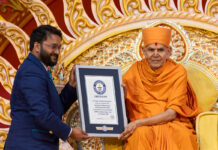 Modern day world is considered to be at the pinnacle of technological advancement and the ever changing society today has evolved into what is popularly called the knowledge society. At all times, from ancient history to recent past, different societies have transformed with numerous inventions and explorations. Regardless of these changes, ignorance invariably prevails in man’s heart. Einstein once quoted, “It is easier to denature plutonium than to denature the evil spirit of man.”
Modern day world is considered to be at the pinnacle of technological advancement and the ever changing society today has evolved into what is popularly called the knowledge society. At all times, from ancient history to recent past, different societies have transformed with numerous inventions and explorations. Regardless of these changes, ignorance invariably prevails in man’s heart. Einstein once quoted, “It is easier to denature plutonium than to denature the evil spirit of man.”
Our ignorance is the cause of all misery, and no advancement in physical science can rid us of this ignorance. The scriptures call this material world as ocean of nescience and its material energy is giving us innumerable miseries – adyatmik (due to body and mind), adidaivik (due to environmental reasons), adibhautik (due to other living beings).The Bhagavad Gita, however gives us the process for obtaining release from this never ending anguish:
Mamevayehprapadyante…
Shree Krishna says: “If you surrender to Me, you will cross over the ocean of Maya”.
Yet the aim of our life should not be to attain moksha (liberation from Maya). Rather, our goal should be God Realization, and moksha will happen automatically. This is just as someone makes removal of poverty as his goal.
The other person makes accumulation of wealth as the goal, and poverty is automatically removed when wealth is obtained. Similarly, the intelligent person endeavors not for liberation from Maya, but for God-realization.
Ancient Vedic scriptures and Saints have extensively described the Science of God-realization, mainly through three different paths of karm, gyan and bhakti. These three paths are discussed here drawing attention to the sweetest path, filled with nectar of selfless love for God, called bhakti.
Question: Why did Hinduism describe so many different approaches to God-realization, and not one approach like all other religions?
SM: Variety is an inseparable part of God’s creation. No two leaves of a tree are alike. No two human beings have exactly the same finger prints. Similarly, everybody has different nature too. The variety of paths mentioned in the scriptures accommodate peoples’ variegated natures.
As knowledge becomes subtler and more elevated, its branches increase. In Grade Five, students are taught General Science as one subject. But when they reach Grade Seven, Science is divided into three branches – Physics, Chemistry and Biology. When they reach college, it is further divided into hundreds of branches. And in Graduate School, there are literally thousands of subjects within Science.
Similarly, the Vedas take spiritual knowledge to sublime heights, and hence the variety of paths and spiritual aspirants gets reflected and addressed. This variety is a blessing. In the world, if five people go to purchase a cloth, all have their own choice of color and style.
Similarly, in the case of God-realization, if there were only one path, people whose sanskars were different would not have been attracted to it. The variety of paths serves a wider spectrum of people with varying natures and sanskars.
Q: Why do scriptures state that bhakti is essential even in the path of karm and gyan?
SM: God is divine, while our instruments of sadhana – the senses, mind and intellect – are material. Whatever path we may follow, by our own sadhana, we can never reach the Supreme Lord. But when God bestows His grace, by His divine energy He makes our senses, mind and intellect divine. And then we are able to see Him, hear Him, know Him, realize Him and attain Him.
Thus, it is only by God’s grace that He is attained. This grace of God requires that we please Him through Bhakti. Hence, the karmi and gyani also need to do bhakti for success in their sadhana.
Alongside bhakti, you may keep any other sadhana. If you do karm and bhakti, it will become karmyog; if you do gyan and bhakti, it will become gyanyog; and bhakti by itself is bhakti yog, but without bhakti no sadhana will result in God-realization. Our link with God will be established through bhakti alone.
Q: What is “Kundalini,” how is it awakened, and what are the benefits of awakening it?
SM: The material energy, Maya, has innumerable astounding powers and secrets within it. The inventions of modern day world are only the tip of the iceberg of what exists within the womb of Mother Nature. The human body, made from Maya, also has many secrets and hidden potentials. Amongst these is the Kundalini.
Kundalini is a power that lies dormant at the base of the spinal column. Those who practice the sadhana of hatha yog, endeavor to awaken it by various means, and make it rise upwards through the spine. As the power ascends through the various chakras (circular regions) in the spine, it results in many siddhis (mystic abilities).
However, we must bear in mind that the Kundalini is a material power, and not a spiritual power. The mystic abilities attained through it are purely material. If one’s Kundalini is awakened, it does not mean that the person has come closer to God, or has established a relationship with God.
Also, if the Kundalini is awakened without spiritual maturity, it leads to pride, which obstructs the spiritual progress of person. The Kundalini is an immense power, and if not controlled properly, it can result in very deleterious side-effects. Very often, people who awaken it without sufficient bodily and mental preparation are unable to handle it, and suffer serious consequences. In some cases, the body gets ruined, and in other cases, the mind.
It is far safer not to go in that direction and instead strive to establish one’s connection with God through devotion. Then by the Grace of the Lord, if we get any siddhis, we will also receive the power to protect ourselves from their pitfalls. The important thing is not the awakening of the Kundalini, but the development of an intense longing for God.
Q: How does meditating on the charkas help in God-realization?
SM: There are seven main chakras in the body, along the spinal column. Meditating upon them leads to siddhis, or mystic powers, and also induces the upward movement of the Kundalini power. Chakra meditation is recommended for people who have less faith in God and have not yet understood the concept of the relationship of the soul with the Almighty.
This chakra meditation does not develop our love for God, or help us realize our eternal position as His servant. Hence, those who have faith in God, and have understood from the scriptures that we have an eternal relationship with Him, should not go for chakra meditation. Instead, they should try to meditate upon God, and his names, forms, virtues, pastimes, abodes and saints.
Q: Vedic knowledge is the knowledge of God, and is therefore infallible. Yet it describes the caste system, which has plagued our society and seems incongruous in modern context. Please explain its relevance in Hinduism?
SM: The Vedas define duties at two levels:
1. Spiritual duties. These are our duties towards God, who is our eternal Father, Mother, Friend and Well-wisher. Performing these is called bhakti, or devotion, and it results in the purification of the mind and the attainment of God. The spiritual duties, or bhakti, are the eternal principles that always remain the same. They are also called Para Dharma, or the spiritual aspect of religion.
2. Social duties. When we think of ourselves to be the body, we have duties towards our parents, friends and relatives, the society we live in, the nation of which we are citizens, etc. These do not result in God-realization. However, fulfilling these duties ensures that we act in a responsible manner, and contribute towards the well being and harmony of society. These duties have been described in the Vedas, and are also called karm or karm dharma. They are also called Varnashram dharma.
In this Varnashram system, the duties were defined according to a person’s nature and occupation. However, with the passage of time, the system got degraded and the classifications became based on birth. This social practice was a wrong interpretation of what was mentioned in the Vedas. But when the British ruled India, they highlighted the social practice, and called it “Caste system”.
They publicized it so much that even today in USA, if the discussion of Hinduism comes up, the only thing many people know about it is the caste system. They are not aware of the sublime knowledge of the science of God-realization that exists in Hinduism, which has no comparison anywhere in the world.
It is thus necessary to clarify that the Varnashram system was not a part of the spiritual principles of Hinduism. It was a set of social duties described in Hinduism thousands of years ago, when civilization in the western world had not even begun. Secondly, if it got distorted with time, that was a social defect, and Hinduism cannot be blamed for it.
This is just as slavery existed in the western world until two hundred years ago. In fact, even until the 1960s discrimination on the basis of skin color existed in USA. This was a social ill but we do not hold any religion in USA responsible for it. Similarly, the Varnashram system got distorted as a social ill in India, but it is wrong to blame Hinduism for it.
Q: Is it not sinful to renounce the world or become a Karm Sanyasi to perform our duty to God and forfeit all other duties?
SM: In the answer to the previous question, it has been mentioned that we have social duties towards society and spiritual duties towards God. If one gives up social duties due to irresponsibility, laziness, frivolity, etc. it is definitely a sin; but if one renounces the social duties to embrace spiritual duties, it is not considered a sin.
When we surrender to God, we are automatically taking care of all duties, just as when we water the root of a tree, the water automatically reaches all the branches, fruits and flowers of the tree.
For example, we do have duties towards the biological parents. But God is our spiritual Father and Mother. We have a duty towards Him as well, and that duty is even more important than the worldly duties. Even in the world, if someone joins the army to discharge his duty to the nation, he is forsaking his duty to his parents. He could be killed on the battlefield, leaving the old parents without a support.
But his joining the army is not considered dishonorable; rather it is an act of bravery. This is because that person is giving up a lower duty to take up a higher one. Similarly, the karm sanyasi does forsake the worldly duties to parents etc, but he accepts the higher duty towards God, and so he is not committing a sin.
However, the path of karm sanyas should only be chosen under the guidance of a Guru. For the majority of the people, the path of karmyog is more suitable.
Swami Mukundananda is a world renowned spiritual teacher from India, and is the senior disciple of Jagadguru Shree Kripaluji Maharaj and founder of JK Yog. He has received his degrees in engineering from world renowned institutes in India, IIT and IIM. He has inspired people all over the world on the path of spirituality, holistic health, yoga, meditation, service to society and God realization. This year, Swamiji will be conducting weeklong programs in 30+ cities of USA from April onwards. For more information visit: http://www.jkyog.org/ or contact: secretary@jkyog.org
To attend Swamiji’s Yoga, Meditation and Spiritual Discourses in USA, see the schedule for your city:www.jkyog.org/2013
Swami Mukundananda






